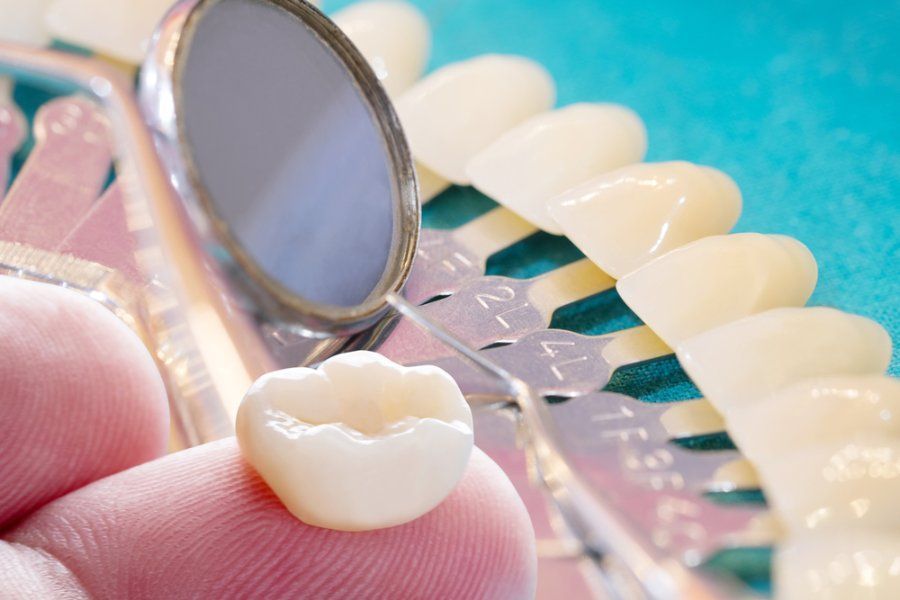Dealing with a Dental Crown Emergency

A dental crown emergency typically involves pain, instability, or visible damage to the function of the crown or the health of the underlying tooth. If left untreated, these issues can escalate quickly, potentially leading to infection, increased sensitivity, or loss of tooth structure.
Not all dental crown issues qualify as an emergency, but some situations require prompt attention to prevent further damage, relieve discomfort, or avoid infection. Understanding the difference between a minor concern and a dental emergency can help you decide when to seek immediate care.
At Dental Arts of Cherry Hills, we understand that dental emergencies can be uncomfortable and stressful. Our expert prosthodontist, Dr. Konstantinos Harogiannis, uses advanced technology and our in-house dental lab to address crown emergencies quickly and efficiently.
Whether you’re dealing with a dislodged, damaged, or painful crown, we can help restore comfort and protect your smile.
Dental Crown Emergencies & Their Causes
Dental crowns help restore the strength, function, and appearance of damaged or weakened teeth. Whether placed after a root canal, used to cover a large filling, or to protect a cracked tooth, crowns are designed to be durable and long-lasting.
However, like any dental restoration, crowns can sometimes develop complications, especially if the underlying tooth structure changes over time. Understanding the common types of dental crown emergencies and what causes them can help you act quickly and appropriately.
Crown Falls Off
One of the most common dental emergencies is when a crown completely dislodges from the tooth. This can happen for several reasons.
- Cement Failure: Over time, the dental cement used to hold the crown in place could weaken or wash away.
- Tooth Decay: If decay develops beneath the crown, it can change the shape of the supporting tooth, loosening the crown.
- Sticky or Hard Foods: Chewing on sticky candies, gum, or hard foods like ice can pull or pry a crown loose.
- Improper Fit: A crown that wasn’t properly fitted from the beginning may not adhere securely or shift with time.
When a crown falls off, the exposed tooth is vulnerable to sensitivity, decay, and structural damage. Delaying care increases the risk of pain, infection, or even tooth loss. Prompt dental attention is necessary to either re-cement the crown or custom-make a replacement.
Cracked or Broken Crowns
Crowns are strong, but they’re not indestructible. They can chip, crack, or fracture due to the following reasons:
- Chewing Hard Objects: Biting on ice, popcorn kernels, or hard candy can stress or break the crown.
- Bruxism (Teeth Grinding): Nighttime teeth grinding or clenching exerts chronic pressure, gradually weakening the crown.
- Trauma: Any impact to the face or jaw, such as a fall or sports injury, can cause a crown to crack or break.
A damaged crown can expose sharp edges that irritate the soft tissues of your mouth, interfere with your bite, or leave the tooth underneath unprotected. Early intervention prevents discomfort and further complications.
Severe Pain Under the Crown
Pain or sensitivity under a crown can occur due to several reasons, including:
- Decay: Bacteria can seep under the crown margin and cause decay at the base of the tooth.
- Nerve Damage: Pain can develop if the nerve inside the tooth becomes inflamed or infected, especially if a root canal was never performed.
- Improper Fit: A poorly fitting or deteriorating crown may irritate the gum, resulting in constant pain.
Persistent pain could indicate the need for a crown replacement. Leaving the issue untreated may worsen the infection or compromise the tooth’s structure.
Loose Crown
A crown that shifts or feels unstable when you chew or touch it is a clear indication that it’s no longer securely attached. This looseness can result from the following causes:
- Worn-Out Cement: Over time, the dental adhesive that holds the crown in place can weaken or wash away, reducing its grip.
- Tooth Structure Changes: Decay, erosion, or trauma to the underlying tooth can alter its shape, causing the crown to fit less snugly.
A loose crown can create gaps where food particles and bacteria accumulate, increasing the risk of tooth decay and gum inflammation. If left untreated, the crown may eventually fall off or lead to more extensive damage to the tooth beneath. Prompt evaluation and treatment can help secure the crown and protect your oral health.
Infection or Abscess Near the Crown
Swelling near the crown, a persistent bad taste, or the presence of pus are signs of an infection below the crown. This can occur for several reasons.
- Decay Reaching the Pulp: If decay develops beneath the crown and extends into the tooth’s inner pulp, it can lead to nerve infection and inflammation.
- Failed Root Canal: In cases where the crowned tooth has previously undergone a root canal, bacteria can sometimes re-enter and cause a recurrent infection or abscess.
If left untreated, infections can progress rapidly and may spread beyond the tooth to the jaw or bloodstream. Prompt care is essential to relieve pain, clear the infection, and protect your overall oral health.
What to Do If You Have a Crown Emergency
Experiencing a dental emergency can feel unsettling, especially if you're dealing with tooth pain, sensitivity, and an unexpected disruption to your daily routine. It’s important to contact your dentist as soon as possible. Prompt action can prevent serious complications and ensure effective emergency care.
To avoid worsening the situation while you wait to see your dentist for a dental crown emergency, you can follow these immediate steps.
- Try not to chew on the side of your mouth where the crown is damaged, loose, or missing to prevent further injury or discomfort.
- Gently rinsing your mouth with warm salt water can help cleanse the area, reduce bacteria, and soothe irritation.
- If your crown has come off completely, try to find it and rinse it with water. Place it in a clean, dry container and bring it to your dental appointment.
How We Help with Dental Crown Emergencies
At Dental Arts of Cherry Hills, we understand that experiencing crown issues can feel painful, disruptive, and stressful. Dr. Kostas combines compassion with cutting-edge technology to resolve dental emergencies quickly and comfortably.
Whether your crown is cracked, loose, painful, or has completely dislodged, we offer urgent dental appointments, so you won’t have to wait days to get the care you need.
Our team uses advanced 3D Cone-Beam imaging to evaluate the full extent of the problem. Your treatment will depend on the condition of your crown and the health of the underlying tooth.
We offer a full range of restorative solutions, including:
- Re-cementing an intact crown if the tooth structure is healthy
- Repairing minor damage to the crown, when appropriate
- Replacing a broken or worn crown with a new custom one
- Tooth extraction and implant placement, if the natural tooth cannot be saved
Tips to Prevent Future Crown Emergencies
While dental crowns are designed to be strong and durable, they’re not immune to damage or complications over time. Here are some practical tips to help protect your crown and your overall oral health.
- Maintain good oral hygiene by brushing twice a day with fluoride toothpaste or using an antibacterial mouth rinse. This can help defend against the decay and gum disease that can compromise the stability of your crown.
- Avoid chewing on hard objects, such as ice, hard candies, or popcorn kernels, to prevent cracks or dislodgement of the crown.
- Use a nightguard if you grind your teeth to prevent constant pressure on your crown and natural teeth.
- Visit your dentist regularly for check-ups to monitor the condition of your crown and the tooth beneath it.
Pain-Free Dental Crown Emergency Care in Englewood, CO
Dental crown issues can escalate quickly, compromising your comfort and smile. Timely intervention helps prevent further damage and save your natural tooth.
At Dental Arts of Cherry Hills, we offer fast, reliable care and restorative solutions tailored to your needs.
To schedule a consultation, please call us at 720-868-8092 or request an appointment online.
